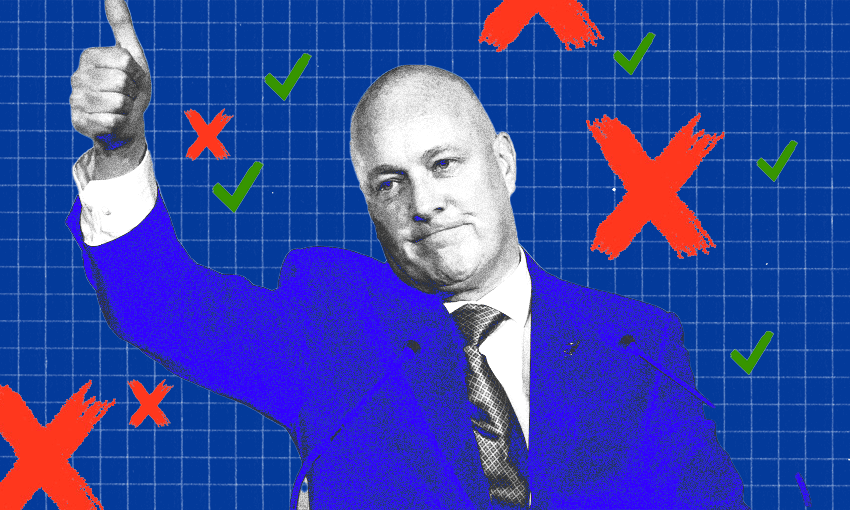The government wants local communities to make their own decisions. The only problem – they keep disagreeing with the government.
If there’s one thing the prime minister loves, it’s locals. Local government, local ice cream shops and local airlines. Most of all, he loves localism; the idea that local people should have control over what happens in their local area, rather than central government. It’s one of his favourite things, right up there with business school jargon, the general state of being strong and stable, and the word “actually”. In fact, Christopher Luxon is so committed to devolution of power that he signed New Zealand’s first ever three-way coalition deal, making him the least powerful prime minister in living memory.
For a prime minister who is often accused of having no ideology, localism is one thing Luxon deeply believes in. “Centralism over localism doesn’t work,” he told parliament last year. He described centralisation as “a robbery of power and control from local communities.” He reiterated it in his impressively boring speech at Waitangi this year: “We, like you, believe in localism and devolution, not centralisation and control.”
Localism is a belief that unites all three parties in the coalition. It’s arguably the biggest point of difference between this government and the previous Labour government, which made moves to centralise health, polytechnics, water and the public service.
The coalition government wants the government to do less stuff. As a longtime fan of not doing stuff, I get it. Doing stuff is hard work and should be avoided wherever possible. Public servants are overworked and deserve a redundancy break. The government wants local organisations to do stuff instead, whether that is councils, iwi, community groups or businesses.
For a government, embracing localism means letting go of power. And as Marlin learnt during his quest to find Nemo in the 2005 film Finding Nemo, letting go isn’t easy, but it’s an essential part of growth.
“Central government shouldn’t be running roughshod over local communities,” Luxon said in 2021. Now that he is prime minister, he can finally put a stop to all that roughshodding. There is one slight problem. Local communities keep having the wrong opinions.
Auckland Council, the elected representatives of the largest local community in New Zealand, wanted a regional fuel tax to help it fund local transport infrastructure. Unfortunately, their opinion was wrong. That kind of localism makes car drivers mad, so the government had to get rid of it.
Since 2021, 33 local councils around the country have voted to introduce Māori wards. That might seem like a great example of elected local representatives making their own decisions about democratic representation. Those councils had the wrong opinion. The government doesn’t like that kind of localism, so it will mandatorily require councils to hold a referendum to keep their Māori wards.
In the past few years, several councils reduced speed limits on central city streets or near schools. Some changes were required by Waka Kotahi, but many others were because local communities thought slower speed limits would lead to higher retail spending or fewer children being run over. Once again, that was the wrong opinion. The government is now stepping in to reverse every speed limit that has been lowered since 2020.
Speaking of local communities making their own transport decisions, too many councils are building footpaths, bike lanes and other things that aren’t roads. Like an exasperated parent of an unruly teen, the government had to step in again. The new GPS for transport funding restricts how footpaths can be funded and halves the money available for walking and cycling projects. It’s like giving your kids an allowance that they can only spend at the school uniform shop. Local communities will be empowered to make the right transport decisions for their local area, as long as it is a road.
In March, the government introduced its Fast-track Approvals Bill, which would allow easier consenting for new mines and other projects to give the kiwi its long-overdue comeuppance. Annoyingly, local communities said they would very much like to have a say over projects that would have huge environmental and social costs. Again and again, their opinions are wrong.
This is all very frustrating for Christopher Luxon and his bold localist agenda. The problem, as Luxon puts it, is councils keep doing “dumb stuff”. Locals keep having different ideas and opinions than the government, and it is really getting in the way of localism.
My message to local communities and councils is this: Please listen to the prime minister. He is trying so hard to get the government out of your hair and stop Wellington from forcing its decisions on you. Next time your local community has an opinion about a local issue, please consult the National Party manifesto and the two coalition agreements first, to confirm whether it is included in the list of approved opinions.
As long as your decisions are clearly within the scope of those documents, you have complete control over your own decisions, without the government telling you what you can and can’t do. If you do exactly what you are told, you can have total free will.

